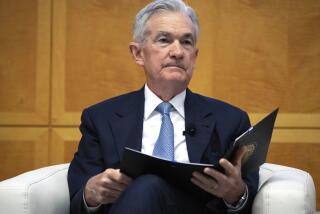ECB Leaves Key Rate Unchanged
- Share via
FRANKFURT, Germany — FRANKFURT, Germany -- European Central Bank President Wim Duisenberg said Thursday that policymakers would not rush to raise interest rates as the European economy struggles to revive.
ECB officials met and voted to leave the bank’s key short-term interest rate at 3.25% for the eighth consecutive month.
In London, the Bank of England met and kept its benchmark rate steady at 4%.
Like the Federal Reserve, which has maintained its key rate at 1.75% since December, the ECB and the Bank of England appear to believe the global economic recovery isn’t robust enough to justify higher interest rates.
In Europe, consumers and companies grew more pessimistic in June as stocks tumbled, confidence polls showed.
Also, the euro’s 10% gain against the dollar this year probably will damp exports, which account for 38% of the euro zone’s gross domestic product. A stronger euro can make exports more expensive for foreign buyers.
“Our attitude is to wait and see,” Duisenberg told reporters. “I’m not without concern, seeing the developments” in European and U.S. stock markets, he said.
“The economy is weaker than anticipated,” said Cees van Lede, chief executive of Akzo Nobel, the world’s largest maker of paints and coatings. “The year should end OK, but I admit the jury is out.”
“Rate increases this year are increasingly unlikely,” said Jan Holthusen, an economist at DZ Bank in Frankfurt.
French car and light-truck sales fell 10% in June, with sales at both Renault and PSA Peugeot Citroen declining. Also, Matalan and Arcadia Group, two of Britain’s biggest clothing retailers, said sales slowed in the last two months.
“People spend less money,” said Eric Gavet, 42, owner of a newsstand on the Boulevard des Capucines in central Paris. “They don’t buy daily papers every day anymore. They think twice before buying magazines.”
The economies of the 12 euro countries and Britain barely grew in the first quarter. Signals have been mixed since then. A report early Thursday showed that foreign orders for German industrial goods rose almost 10% in May, but demand from domestic customers slipped 2.3%.
“Given the wavering recovery, it’s absolutely important we don’t get a rate increase,” said Herbert Meyer, chief financial officer of Heidelberger Druckmaschinen, the world’s biggest maker of printing presses.
With spending weak, retailers find they can’t increase prices to cover rising costs. The inflation rate in the euro countries declined to a 2 1/2-year low in June, under the ECB’s annualized 2% limit for the first time in 25 months.
“Stock markets are depressed, the euro is rising and inflation is within target. That’s not the right time to raise interest rates,” said Bernd Karstedt, who helps manage $97 billion at Union Asset Management in Frankfurt.
Bank of England Gov. Sir Edward George and Duisenberg had signaled in recent months that they would have to raise rates as their economies rebound, to prevent inflation from accelerating.
But both men have since softened their remarks. George said June 26 that policy makers had “a certain amount of time.”
Duisenberg said the euro’s recent rise would help slow inflation as imports become cheaper for European consumers.
Even so, analysts expect both banks to raise short-term rates this year. Almost half of economists surveyed by Bloomberg News expected the ECB to raise rates in September by at least a quarter of a percentage point.
Most see the Bank of England lifting the price of credit in August.
More to Read
Sign up for Essential California
The most important California stories and recommendations in your inbox every morning.
You may occasionally receive promotional content from the Los Angeles Times.













